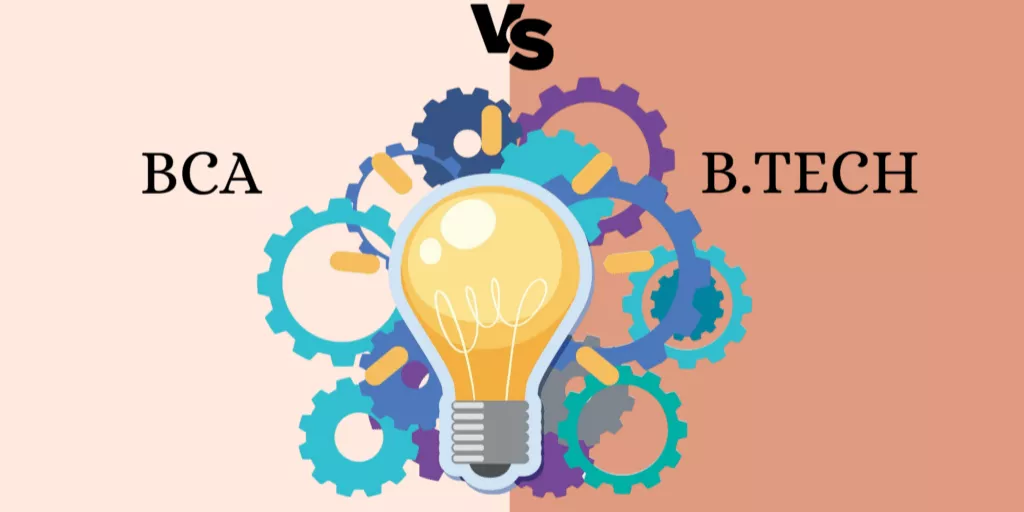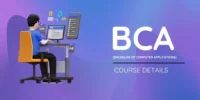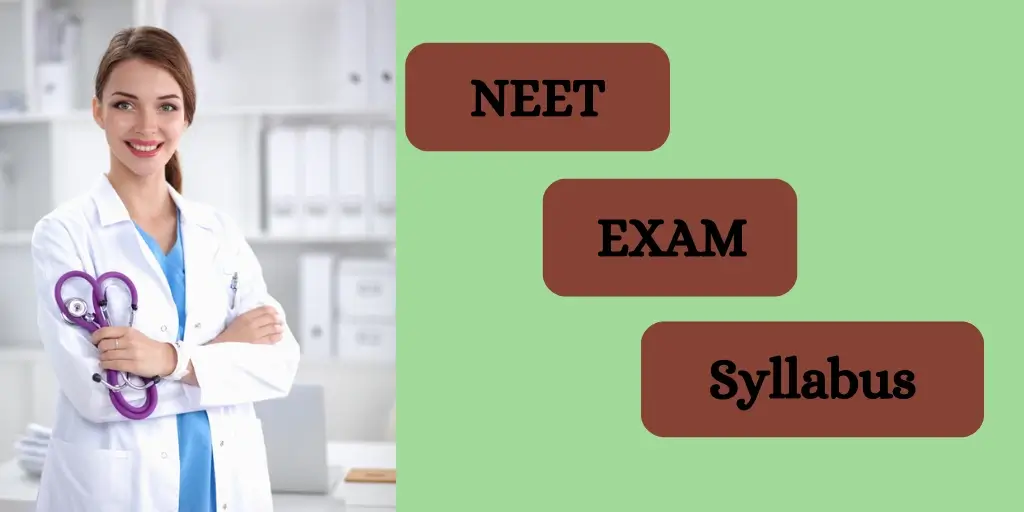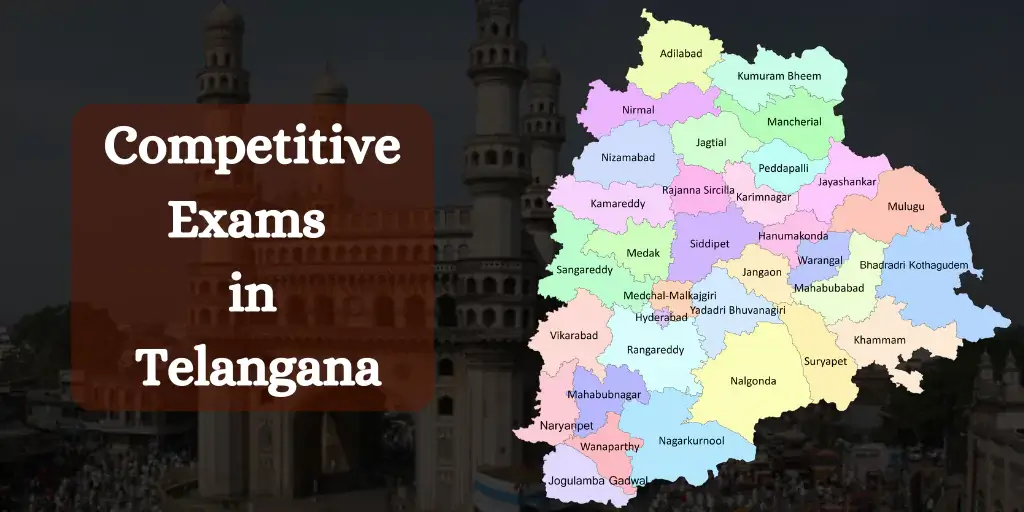BCA vs B.Tech: Full Guide to Choose the Best Course assists students in making one of the most crucial choices they will have after graduating from high school: selecting the best course to pursue a successful career in technology and computers. Among the best options, BCA and B.Tech in Computer Science Engineering stand out as two important pathways to bright futures in the IT sector.
Although both courses deal with computers, they differ significantly in terms of depth, structure, difficulty level, subjects, job options, and pay development. BCA focuses on software applications, programming concepts, and IT tools, whereas B.Tech covers a much broader and deeper range of engineering, computer science fundamentals, algorithms, hardware, and advanced technologies.
BCA vs B.Tech (CSE): A Complete & Detailed Comparison Guide
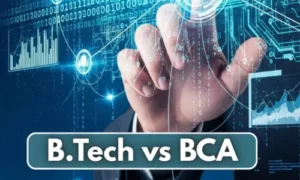
Both BCA and B.Tech lead to careers in the IT field, but they are not the same. Their course structure, difficulty, depth, salaries, and even career growth level differ.
Let’s break down everything in detail.
1. Basic Overview
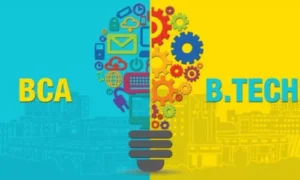
BCA (Bachelor of Computer Applications)
- Duration: 3 years
- Focus: Software applications, programming basics, IT tools
- Nature: Non-engineering degree
- Ideal for: Students wanting a quick start in IT, less math-heavy.
B.Tech (Computer Science Engineering)
- Duration: 4 years
- Focus: Core engineering + in-depth computer science
- Nature: Engineering degree
- Ideal for: Students who want deep technical knowledge and high-paying roles.
2. Course Approach (Very Important Difference)
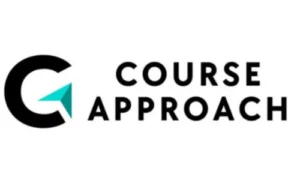
BCA Approach
- Application-oriented (how to use technology)
- Teaches coding, software development, web & mobile apps
- Less hardware & mathematical concepts
- Perfect for students from any stream (Arts/Commerce/Science)
B.Tech Approach
- Engineering-oriented (how technology works)
Teaches:
- Theory of computation
- Data structures
- Algorithms
- Operating systems
- Computer architecture
- AI, ML, Cybersecurity
- Hardware + software integration
This is much deeper and more advanced.
3. Subject (Syllabus) Difference

BCA Subjects
- C Programming
- Java/Python
- Web Technologies (HTML, CSS, JS)
- Database Management
- Software Engineering
- Operating Systems (basic)
- Networking (basic)
- Data Structures (intro level)
✔ Good for understanding programming & IT fundamentals
❌ But lacks deep engineering concepts
B.Tech (CSE) Subjects
- Advanced Data Structures
- Algorithms (Analysis + Design)
- Calculus & Engineering Mathematics
- Computer Organisation & Architecture
- Compiler Design
- Automata Theory
- Database Systems
- Operating Systems (core concepts)
- Networks (in depth)
- Cloud Computing
- AI, Machine Learning
- Cybersecurity concepts
- Embedded Systems
✔ More depth, more industry demand
❌ More difficult
4. Difficulty Level
BCA
- Moderate
- Less maths
- More practical coding
- Suitable for average-to-good students
B.Tech
- High difficulty
- Includes heavy maths + engineering + logic building
- Suitable for academically strong students
5. Admission Process

BCA
- Direct admission in most colleges
- No entrance exam in many states
- 12th from any stream (Maths optional)
B.Tech
Entrance exams:
- JEE Main / JEE Advanced
- State exams: TS EAMCET, AP EAPCET, KCET, MHTCET
- 12th Science (PCM) mandatory
6. Career Opportunities

After BCA
You can become:
- Software Developer
- Web Developer
- Application Developer
- System Analyst
- UI/UX Designer
- Database Assistant
- IT Support Engineer
Long-term growth is good if you do an MCA or a master’s course.
After B.Tech
You can become:
- Software Engineer
- Data Scientist
- AI/ML Engineer
- Cloud Architect
- DevOps Engineer
- Cybersecurity Analyst
- Blockchain Developer
- Embedded Engineer
- Research Scientist
- Solutions Architect
B.Tech opens doors to high-end technical roles.
7. Salary Comparison

BCA Salary
- Starting: ₹3–6 LPA
- After MCA: ₹8–12 LPA
B.Tech Salary
- Starting: ₹5–12 LPA
- Top colleges (IIT/NIT): ₹20–50 LPA
- With experience: ₹15–40 LPA+
B.Tech has a higher salary ceiling.
8. Higher Studies Options

After BCA
- MCA (best option)
- M.Sc. Computer Science
- MBA (IT)
- Data Science Certifications
- Cloud Certifications
- Cybersecurity courses
After B.Tech
- M.Tech / MS (abroad)
- MBA
- PhD / Research
- Specialisation in AI, ML, Cloud, DevOps, Robotics
9. Scope & Growth Comparison
| Area | BCA | B.Tech |
|---|---|---|
| Technical Depth | Medium | Very high |
| Industry Demand | Good | Excellent |
| Salary Growth | Moderate | High |
| Career Flexibility | Good | Excellent |
| Suitable for Non-Maths Students | Yes | No |
10. Which Should YOU Choose?
✔ Choose BCA if:
- You want a simple & fast entry into IT
- You want a programming job without engineering
- You don’t like heavy maths
- You plan to do MCA later
✔ Choose B.Tech if:
- You want a strong engineering & technical base
- You want high-paying tech roles
- You like Maths, coding & problem-solving
- You want to work in Data Science, AI, ML, Cloud, and Cybersecurity
11. Final Conclusion
BCA = 3-year IT degree
- Focus on software & applications
- Easy to moderate difficulty
- Good jobs, great if combined with MCA
B.Tech = 4-year engineering degree
- Deep, technical computer science knowledge
- Harder but more rewarding
- Higher salary and wider job scope
👉 If you want depth, high salary, and a serious tech career → Go for B.Tech
👉 If you want a simple IT path with coding focus → Go for BCA
Conclusion
Both BCA and B.Tech in Computer Science Engineering are excellent courses for students looking to create a career in the IT industry, but they serve various purposes and are appropriate for different types of learners. BCA is appropriate for students who want a simpler, application-oriented approach to programming and want to get started in IT quickly, whereas B.Tech provides a more in-depth, technical understanding of computer science, engineering principles, and sophisticated technologies.


